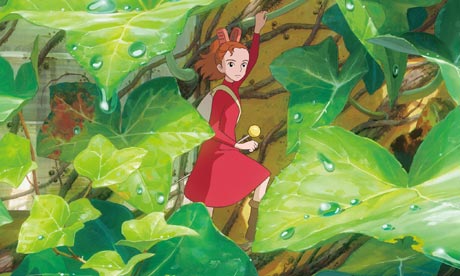Arrietty – review
The renowned StudioGhibli is back with its latest hit, Arrietty,which is an adaptation of British children’s book favourite, The Borrowers. Mary Norton’s popular novel has had several previous TV and film adaptations, including a 1997 film starring the likes of Jim Broadbent and John Goodman. There is also another re-telling awaiting release, starring Stephen Fry.
The story is perfect for Ghilbi’s penchant for magic-realism-style, coming of age stories, which often see young protagonists thrust into an ever-changing journey, meeting awhole host of interesting characters along the way.
In this Japanese reworking of the tale, Arrietty – a 14-year-old girl of the film’s name – lives under the floorboards of a house with her parents and as theoriginal story suggests, they survive by “borrowing” from the human family who live in the rest of the house.
Living like hobos, the life of a borrower is a daily test of instincts, stealth and caution, whilst always being prepared to move on when circumstances change. This particularfamily are settled in a home they have fashioned over the years from incidental objects from the human house, but their situation changes when a young boy named Sho (Ryunosuke Kamiki) arrives at the house.
Sho is seriously ill andhas been sent to stay with his Aunt Sadako (Keiko Takeshita) to rest, while heawaits a liFe or death operation. This new presence in the house changes things for the family of borrowers, who are now more vulnerable with another human “bean” – as the borrowers call them – in the residence.
Borrowers must not been seen by humans, as the threat is too great for their safety and their home and if they are seen, it means it is time to move on again.
Unfortunately, around the time of her initiation in the art of borrowing, Arrietty (Miraj Shida) allows herself to be seen by Sho. Even though Sho is a tender boy who himself is not athreat to Arriety and her parents, his sighting and the domino effect that follows means her life will never be the same.
The presence of little people has been a myth within the household, with no substance to the whispersmaking their existence anymore than fantasy, but as Sho’s Aunt’s scheming,toad-like maid Haru (Kirin Kiki) starts sniffing around, Arrietty’s family are suddenly in great danger.
Arrietty’s histrionic mother Homily (Shinobu Otake) is in a state of panic, whilst her brave father Pod (Tomokazu Miura) seeks out a new place for the family to settle, with help from a curious nomad called Spiller (Tatsuya Fujiwara).
Although the scope of Arrietty and levels of wild imagination do not match the likes of the highly-acclaimed Spirited Away, Ghibi have again produced some remarkable animation. The bursts of colour and detail of the landscapes are nothing less than stunning.
As with Spirited Away, the strong lead character drives the story and there are the usual touches of humour – mainly involving the slightly mad Haru – mixed with the usual tenderness and emotive moments.
Looking beyond thefantasy element of the film, Arrietty is a simple, but touching reworking of a tale of growing up, dealing with change, family bonds and youth’s unquenchable curiosity. Arrietty learns to respect life’s dangers, hone her survival instincts, and with her poignant bond with Sho, she acquires other lessons and emotions. It is a beautiful animation, that people of all ages will enjoy and it is a film that deserves multiple viewings for its effortlessly watchable action and charm.
Due to the popularity of the studio’s productions, an English-voiced version was made, calling upon the vocal acting talent of Saiosie Ronan (of Lovely Bones fame), in the lead role. The Rio and other cinemas are showing both the subtitled version and the English version.
Arrietty (U)
Directed by HiromasaYonebayashi
Starring: Mirai Shida,Ryunosuke Kamiki, Shinobu Otake, Kirin Kiki,Tatsuya Fujiwara, Keiko Takeshita, Tomokazu Miura
Running time: 94 minutes
Arrietty is showing at the Rio Cinema until 4 August.

